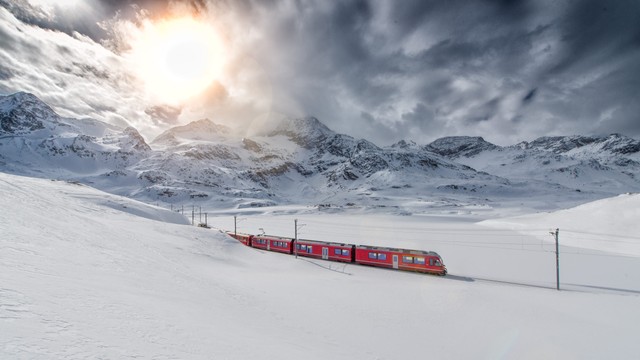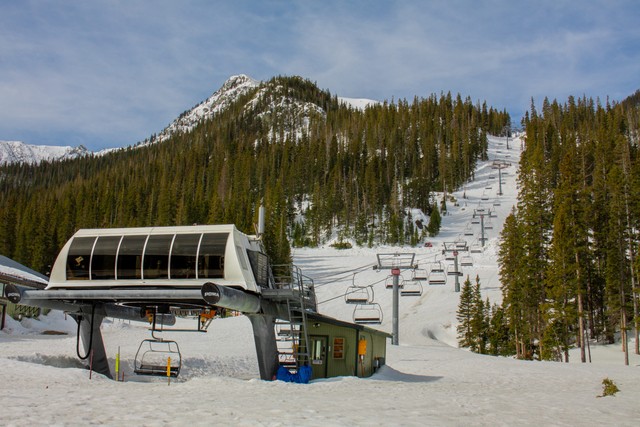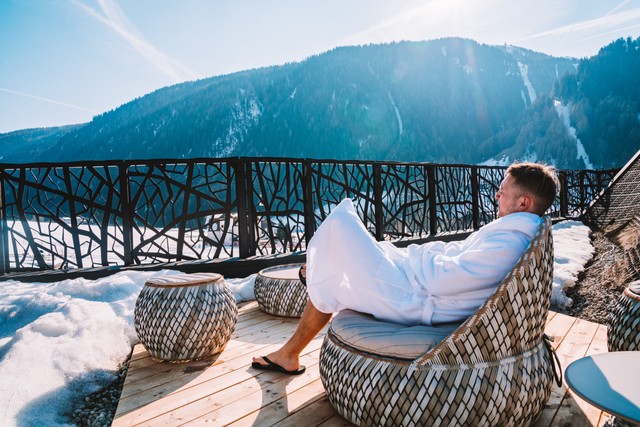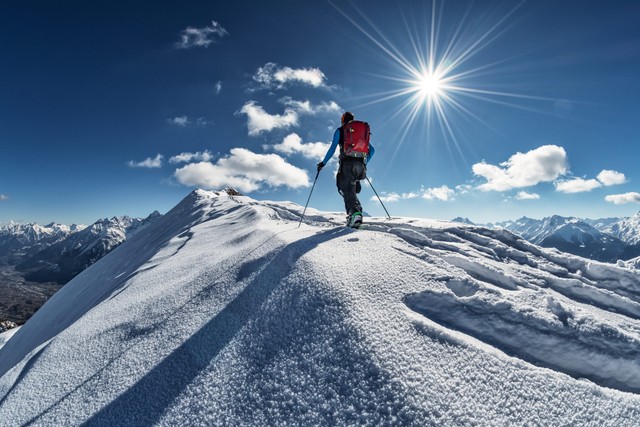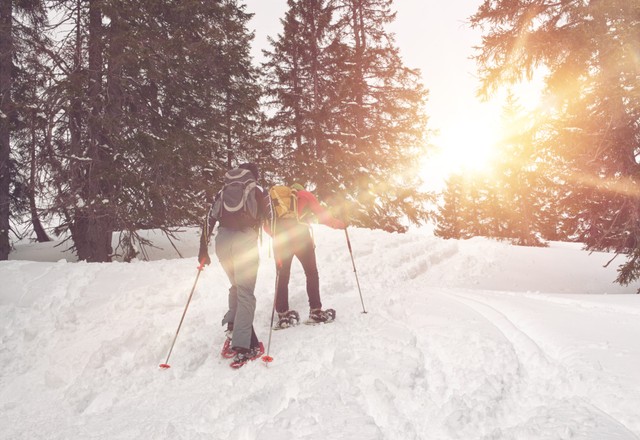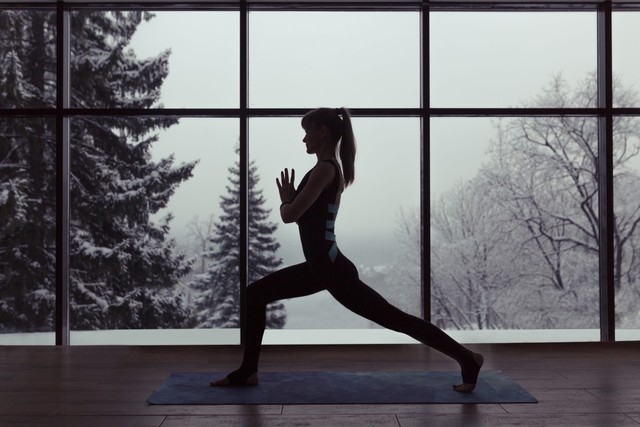After almost 18 months without skiing for most enthusiasts, the early signs are that next winter could be a record-breaking season.
Yet there’s a sense that Covid has changed many people’s priorities. After a year of being stuck inside with the tension of a global pandemic, high-octane, apres-fuelled ski trips are no longer top of the wish list.
Instead holidaymakers are increasingly looking for ways to minimise stress and maintain a sense of the slower pace found in the last year. Many are also looking to tread lightly and reduce the impact on the planet and themselves. So in this post, we look at seven ideas to make your ski holiday more mindful this winter.
Let the Train Take the Strain
Why do we do it to ourselves? Starting a holiday at the airport is an easy way to start your holiday stressed.
Flying is a series of non-stop deadlines from argumentative automatic check-in machines, to packing plastic bags of toiletries at security. After passport control it’s a two-mile jog to the gate, when you’ll find out whether your hand luggage has been bumped into the hold.
Alternatively, checking in to Eurostar at the elegant London St Pancras hub is a civilised affair. It rarely takes longer than 20 minutes from arrival to departure lounge, and en route, you can get up and stretch your legs, any time you want, watching the countryside pass by.
Changing trains in Paris is easy, either by Metro, or a pre-booked taxi. Your connecting TGV will then whisk you direct to the gateway towns of the Alps.
Taking the train does usually take longer than flying (assuming your plane leaves on time), but the door-to-door difference is marginal. More importantly, your holiday starts earlier. So why not cut out the airport stress and let the train take the strain?
Editor’s note: You can do the same in America with Amtrak’s Empire Builder, Winter Park Express, and other romantic-sounding trains to destinations in the US and Canada. Read more here.
Choose a Green Ski Resort
Sustainable skiing starts with operations. According to a survey in June 2021 by LISTEX, almost half of skiers say that a destination’s environmental policies have a significant impact on their choice of resort.
But how do you cut through the ‘greenwash’ and choose a truly green resort?
The ‘Flocon Vert’ accreditation in France is an excellent place to start. The bar is set so high for this award that to date only eight resorts have been allowed to claim it.
Resorts must meet high standards in over 20 criteria, ranging from the prosaic (a well-organised rubbish collection service) to the systemic (sustainability education in schools).
If that sounds like too much research, then at least ensure that the resort you choose uses renewable energy to power its lifts. Then you can be confident that each run you take will have a minimal impact on emissions.
Editor’s Note: In North America, accreditation from organizations like Stoke Certified or the Global Sustainable Tourism Council can help you find sustainable resorts. We also recommend looking for LEED Certification or B Corporation status. Or you can read our article on the topic: These Are the World’s Most Sustainable Ski Resorts
Stay Longer
An easy way to reduce your impact and get the most out of your next ski holiday is simply to stay for longer.
Research has shown that 70% of the carbon emissions associated with a trip to a ski resort come from your journey, so the carbon cost of extending your trip is negligible.
Longer trips are likely to be more common this winter. A study by the Mountain Trade Network revealed that 18% of holidaymakers are planning trips of at least two weeks in 2021/22, compared with just 8% in previous years.
On a regular week-long trip, you need day one to recover from the journey, days two and three to get your ski legs back and by the time you’re back into the groove…you’re already starting to think about the journey home.
On a two week holiday you have time to relax properly…and actually enjoy your holiday.
Skin Up, Slow Down
Skiing has a reputation as an ‘adrenaline’ sport, but with the lifts closed across most of the Alps last winter, ski touring – when you attach ‘skins’ to the bottom of your skis, allowing you to grip the snow and climb upwards – hit new levels of popularity.
Who needs lifts? Just take your time and work your way up one of the many marked trails up the mountain.
Yes, it will take you longer, but never again will you be crammed in a lift with someone in a jester hat who thinks it’s hilarious to moo like a cow.
Reconnect with Nature
Few people enjoyed lockdown, but one unexpected consequence is that it helped us develop a new appreciation of nature.
Research for Mental Health Awareness Week has shown that people who are more connected with nature are happier in life and 89% of people surveyed by Natural England agreed that natural spaces are good for mental health and wellbeing.
So where better to reconnect with nature than in the mountains?
Start off by taking a walk through the mossy woods on one of the many hiking trails and breathe in the clean forest air.
Snowshoeing is another popular way to literally get off the beaten track, as you forge a new path through the virgin snow, one eye looking out for chamois or deer as they bound off through the trees.
Try Some 'Snowga'
If you love yoga, then this could be the winter to try ‘snowga’. Many ski resorts and tour operators offer yoga or meditation courses and retreats, suitable for all ability levels.
Try the ‘Zen Altitude’ festival in Méribel for two weeks of practice with the inspiring mountains of Les 3 Vallées as your background.
Or if you want to mix it up, then you can try ‘snowshoe yoga’ in the Pyrénéan resort of Saint Lary, or even yoga on skis in Morzine, which has created the first ever yoga ski run in France, with a series of 10 positions to complete as you make your descent.
In America, a 10,000-year-old crater near Park City, Utah allows for paddleboard yoga in the dead of winter, or you can go traditional in Aspen with Mountaintop Yoga in a heated lodge.
Buy Local, Eat Local
Another way to be more mindful on your ski holiday is to put more thought into where you shop and eat out.
It’s easy to look out for local products on the menu or swap the ‘Super U’ for the farmers’ market when shopping.
Increasingly, businesses in ski resorts are choosing to make their own products, from making their own bread, ice cream or jam to the growing choice of craft beers brewed in the Alps.
Chez Pepe Nicholas in Les Menuires uses its own ‘jardin en permaculture’ for herbs and vegetables, with diners invited to take a tour of the garden.
In Zermatt, ‘Potato’ may sound a prosaic name for a restaurant, but this new Swiss fine dining establishment (pictured above) is more than just carbs, and all ingredients are sourced from within a 50km radius.
Whistler Blackcomb has gone so far as to compost at its restaurants, and Killington Resort in Vermont promises locally sourced and vegetarian options year-round.
—
Wherever you choose to take your ski holiday next winter, there are plenty of ways to make it a more mindful experience.
The more relaxed and self-aware you are, the more you’ll notice the sensations feeding back from your skis, adjust without over-thinking it, and cruise stylishly over the piste. And who doesn’t want that?
About the Author: Iain Martin is an award-winning journalist and leader in sustainable travel based in the UK. He runs three helpful sites dedicated to snowsports: Ski Flight Free, the Ski Podcast, and Skipedia.
